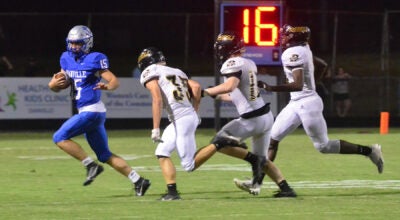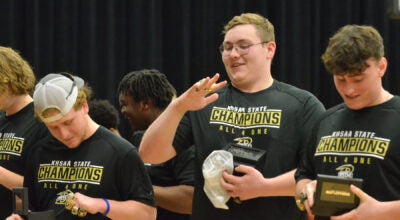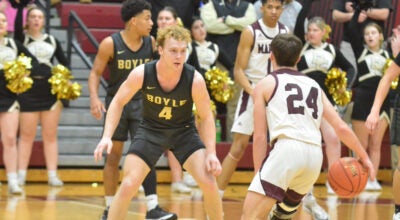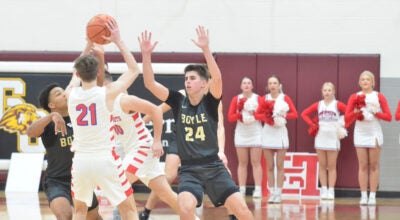Coaches deal with uncertain spring weather
Published 11:38 am Monday, March 27, 2017
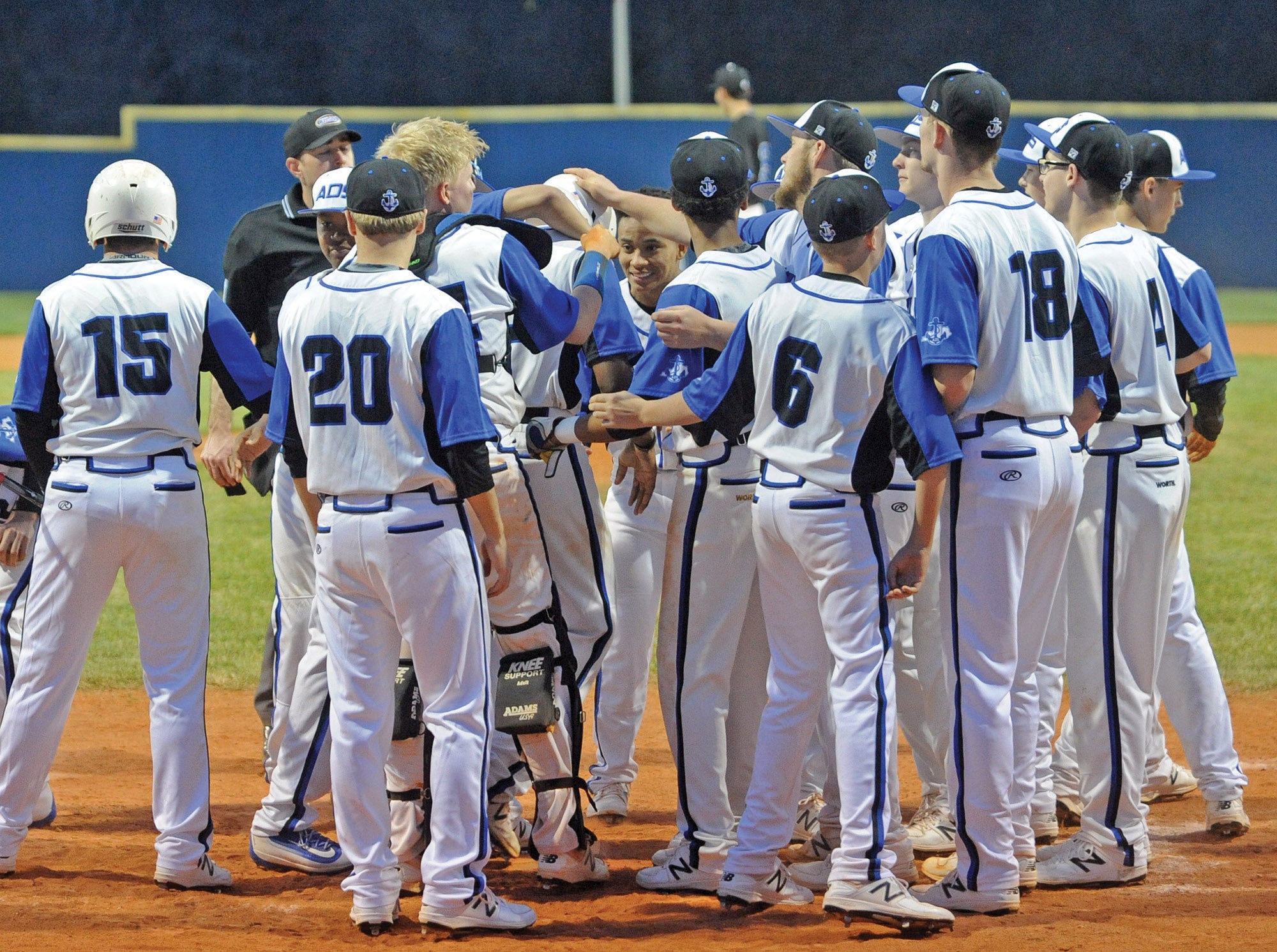
- Matt Overing/matthew.overing@amnews.com
Hopefully the first Monday Mailbag of the spring sports season doesn’t jinx anything, but area teams have been lucky so far with the weather and a lack of postponements and cancellations.
Sure, it’s been cold, but the soggy, wet conditions haven’t toyed with anyone’s schedule too harshly.
But it’s a fact of life in the spring — cancellations and postponements are going to happen. So how does a coach respond to such conditions? We asked that question in this week’s Mailbag.
1. Spring sports are notorious for their delays and cancellations. While we’ve been fairly lucky so far this year, how do you normally deal with what can be a lot of starting and stopping in the schedule?
Brandon Hillard, Casey County baseball: Start and stop in the schedule is part of the game. You can’t control it anymore than you can a traffic jam. You make adjustments.
Brian Deem, Boyle County softball: If weather comes in, we will hold team meetings, then go out after weather breaks, simulating a rain delay.
Jon Vaughn, Casey County track: If a track meet gets cancelled because of weather, we are OK because we can train and, in my opinion, get as much or more out of the practice session.
Todd Montgomery, Garrard County softball: We try our best to stick to a normal routine whether it’s game day, practice or a rainout, the team knows the schedule we have set. If it looks like the players need a day to recharge their batteries, I will take advantage of a rainout to give them a day off.
Marvetta Overstreet, Casey County tennis: We try to keep enough open dates that we can reschedule as often as possible. It’s tricky and doesn’t always work, but area coaches try to work together. You can’t control the weather, so you just have to make the best of what you’re given.
Paul Morse, Danville baseball: Early in the spring in Kentucky for baseball is always challenging. Those weeks when you get several days in a row with rain or really cold temperatures. It’s hard to keep your timing down as a hitter. I think it affects the hitters the most. If you’re not getting swings in every day, it’s hard to get into any kind of groove. This time of year getting some days off with the weather is not always bad for the pitchers. When you get into that second to third week of the season you usually start to see guys getting some sore arms from really throwing for multiple days in a row for the first time of the year. So a day off every now and then early in the year is not always bad.
Chris Verhoven, Danville track: After 18 years of coaching, you just learn to roll with it. Good news is it affects everyone the same so you just make sure your athletes are as prepared as possible. You never know how weather will impact postseason so you try and be ready for any and all situations.
Kyle Wynn, Boyle County baseball: You’re correct in saying notorious. That somewhat makes it easier. It’s always frustrating but when you know it’s going to happen, you are better prepared to deal with it. We only played two games last week and six this week!
2. Is it challenging to go from a game in the 40s one night to a game in the 70s the next night? How does that change focus or preparation or in-game strategies?
Hillard: Challenging? Ha! It’s a blessing. Weather doesn’t change our approach.
Deem: To play in that weather you have to practice in it. We train their bodies and more importantly their minds on how to handle the elements.
Vaughn: In the sport of track you have to just dress for the weather and go with it. I think we benefit from having cross country runners on the track team. They are used to not only the weather changes but also terrain difference which they do not have to deal with in track.
Montgomery: When the weather is cooler, extra time for stretching and warming up is mandatory. We stress that during all practices and games. As far as games, I remind the team to dress in layers so that they can adjust to the temperatures and conditions. During bad weather, we constantly remind the players of field conditions to help them make adjustments and/or reactions to plays during the game.
Overstreet: It is extremely challenging to experience the weather extremes. One night we left Casey County at a comfortable 58 degrees and stepped off the bus in Boyle County to find that a cold front had moved in and it felt like walking into air conditioning. The focus is the same no matter the temperature, but we often have to shorten to pro sets instead of best-of-3-set matches. The greatest difficulty is that our hands get so cold, and it’s almost impossible to grip a racquet while wearing gloves. We always carry our layers with us — blankets, hoodies, etc., and we’ve learned to use Hot Hands body warmers to keep our core warm; they help.
Morse: The weather this time of year can be frustrating. One of the many things my father taught me when I was younger was to not worry about the things you can’t control. The weather is definitely one of those things. One thing I always tell our guys at Danville is, it doesn’t matter if it’s 30 degrees, raining, bad field conditions, or an early morning game, both teams are dealing with the same conditions. The team that can BE STRONG and fight through what ever adversity it is will when the game. Early in the season in Kentucky the weather is a big adversity to fight through.
Verhoven: Of course it impacts you, physically and mentally. Track is so mental, you just try and put a positive spin on things. I remind my kids that our competition runs in the exact same conditions we do, so don’t use weather as an excuse.
Wynn: It is challenging but again it’s something we are used to this time of year. We always tell the guys to be prepared for short sleeves all the way to jackets and fleeces. The focus is just recognizing the cold weather and battling through it, and I think our kids have done a great job of it so far. There are a couple games I felt we handled it better than the other team which resulted in victories.
3. Early in the season, what type of things are you looking for from your teams? How do those change as the season progresses?
Hilliard: I want them to handle the baseball and play clean and make adjustments at the plate. All season long that’s what we want to see.
Deem: Early in the year we look for attitude and urgency. As the season moves along, we constantly drive home fundamentals and every scenario possible. By postseason, it’s all about refinement and staying sharp, both physically and mentally.
Vaughn: Early in the track season, I look for decent performances. Definitely do not want to peak early in the season, especially on mid and long distance. Track season can be very hard on them if they race too much, too early.
Montgomery: We really work on the fundamentals of the game. As a coach you don’t want to see mistakes but early in the season is when you want them to occur so corrections can be made. In our case, we have several players that come in from basketball and it takes some adjustment time. Sometimes it can take weeks for them to heal from their aches and pains of the basketball season. I like to challenge the team early in the season with a tough stretch of games. These gives us a good idea of what we need to work on. It also provides an opportunity to see how each player reacts to adversity and the challenges that they will see come district time.
Overstreet: Early in the season, I’m looking for consistency in play and growing in confidence. If we get that three weeks into the season, then we work on refining our skills — focusing on how to address the problems that have shown themselves in our games.
Morse: Early in the year we are looking at a lot of different guys to see what they all can and can’t do and how they can help the team. We are also usually moving our lineup around a lot and seeing what is going to work the best. As the year goes on we like to get thing a little more consistent so the guys can be comfortable in those roles we think are going to be best for the team.
Verhoven: I look for a willingness to work hard and try to make every practice and meet a stepping stone towards your ultimate goal.
Wynn: The things you can control: effort, energy and communication. These are really all you can ask early in the season. We are still putting in coverages, etc. Basketball players are still new. You’re going to make mistakes early so we focus on those three things to get us by at the start. As the season progresses then we are of course looking for execution.
4. Someone gives you $5,000 to spend on your program. What do you do with that money?
Hillard: We would never be short on necessary equipment.
Deem: We would use it to travel to play in the highest level showcases/tournaments as possible.
Vaughn: I would apply the $5,000 toward improved facilities so we could host home meets. Home track meets can bring in very good profits. Unfortunately, like any good sports facility, $5,000 does not go very far.
Montgomery: All programs work with a small budget. An extra $5,000 would be greatly appreciated. We would make additional upgrades to our facilities and add practice equipment. We are constantly band-aiding to keep things working due to the lack of money. People would be shocked to realize how small of budget teams work with and then still be able to put a competitive team on the field.
Overstreet: My first thought is, I would work toward adding a court or two to the existing four that we have. Unfortunately, $5,000 isn’t a lot to work with, but I would take it as a start and hope to get some commitment from other interested partners. I practice 19 players on four courts — not easy. It’s hard to get through matches quickly when we have boy/girl matches, but I’m thankful for visiting teams’ patience. I hope our program can continue to grow; having more courts available to us would allow us to have more efficient practices and allow us to host tournaments at our site.
Morse: A $5,000 donation is always welcome. At Danville I have such a great group of parents and booster club that raise money for our kids and facility. I think sometimes as coaches and players we take that for granted. I want to take this time to thank them for everything they do. Not all schools have that support. If I had that $5,000 donation right now, we would probably use it for some of those things that come up every year that you don’t plan for — new home plate tarp because old one has holes, speaker for field because it stopped working over the winter, and new outdoor batting cage because the old one had mice or something eat holes in it during the winter. Or we might just suck it up on all those and use the money to astroturf our home plate area so we wouldn’t have so many rainouts this time of year.
Verhoven: I spend some on any needs regarding equipment, etc. I would make it a priority to do something fun with it that the team would enjoy. Sometimes we forget the sacrifices athletes make each day. As coaches we have a responsibility to ensure everyone is having fun. Create an experience that can be talked about at reunions. Ultimately that is bigger than victories and awards.
Wynn: Broad answer but put it towards the kids. Simple enough, towards things where the kids wouldn’t have any costs throughout the season.
Follow Jeremy Schneider on Twitter @jschneideramn


